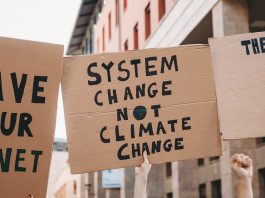A comprehensive Assessment Report by the Intergovernmental Panel on Climate Change indicates that further climate action is crucial to mitigating the impacts of global warming.
The Intergovernmental Panel on Climate Change (IPCC) released a report on 4 April 2022 which indicates that the increase in global emissions has decelerated over the last 10 years, but stresses that further climate action – such as halving global emissions by 2030 – must be taken in order to alleviate the worst effects of global warming.
The IPCC report
IPCC is the United Nations (UN) body for assessing the science related to climate change, formulates detailed Assessment Reports about the state of scientific, technical and socio-economic knowledge on climate change, its impacts and future risks, and the possibilities for limiting the rate at which climate change is taking place.
“We are at a crossroads. The decisions we make now can secure a liveable future. We have the tools and know-how required to limit warming,” said IPCC Chair Hoesung Lee. “I am encouraged by climate action being taken in many countries. There are policies, regulations and market instruments that are proving effective. If these are scaled up and applied more widely and equitably, they can support deep emissions reductions and stimulate innovation.”
The IPCC’s autonomous report emphasises the necessity for urgent action in decarbonising energy, industry, and transport, as well as making homes more energy efficient. These actions must be performed in order to to realise the Paris Agreement’s fundamental objective of ensuring the global temperature rise this century is kept far below 2°C above pre-industrial levels and to pursue endeavours to restrict the temperature increase even further to 1.5°C.
As well as this, the report indicates that there are causes for optimism, with a trend demonstrating a decelerating growth of global emissions. It also describes how economic growth can be attained alongside bold emissions reductions and the falling costs of renewables. As of 2010, solar energy and lithium-ion battery costs have decreased by around 85%, and wind energy by around 55%.
Climate action before 2025 is critical
In the scenarios the group evaluated, restricting warming to 1.5°C necessitates global greenhouse gas emissions peaking before 2025 at the latest, while they must be cut by 43% by 2030. Simultaneously, methane must be reduced by approximately a third. Even if this is achieved, temporarily surpassing this temperature limit is nearly inevitable but could return to below it by the end of the century.
“It’s now or never, if we want to limit global warming to 1.5°C (2.7°F),” commented IPCC Working Group III Co-Chair Jim Skea. “Without immediate and deep emissions reductions across all sectors, it will be impossible.”
The global temperature will stabilise when carbon dioxide emissions reach net zero. For 1.5°C, this means attaining net zero carbon dioxide emissions globally in the early 2050s; for 2°C, it is in the early 2070s.
This assessment indicates that restricting warming to around 2°C still entails global greenhouse gas emissions peaking before 2025 at the latest and being reduced by a quarter by 2030.
The Glasgow Climate Pact
In response to the climate action report, the UK is urging countries to deliver on the Glasgow Climate Pact, whereby 197 countries reached an agreement to revaluate and improve their 2030 emissions reduction as required in order to align with the Paris Agreement temperature goal and thereby limit the worst impacts of climate change.
COP26 President Alok Sharma, explained: “This report makes clear that the window to keep 1.5°C alive is closing alarmingly fast. The warning lights are yet again flashing bright red on the climate dashboard and it is high time for governments to sit up and act before it is too late.
“That is why it is absolutely vital that as agreed in the Glasgow Climate Pact all countries, especially the G20 nations which are responsible for 80% of global emissions, revisit and strengthen their 2030 emission reduction targets this year as necessary to align with the Paris temperature goal if we are to avoid the catastrophic impacts of climate change.
“But this report also gives hope that the rate of growth in emissions is slowing and that thanks to the falling cost of renewables and technological innovation it is possible to transition to a cleaner future.
“We know that a net zero economy presents huge opportunities for growth and the creation of good green jobs and so countries and companies need to accelerate that transition.”
UK takes action on climate change
The UK has now committed to decreasing carbon emissions by 68% by 2030 and by 78% by 2035 compared to 1990 levels, before achieving net zero by 2050. It is urging the global community to respect the commitment to offer at least $100bn a year to support developing countries take ambitious climate action.
UK Minister of State for Energy and Climate Change, Greg Hands, concluded: “Today’s report is a reminder to the world of the grave threat of climate change.
“There is still a window of opportunity to act to reduce the effects.
“The UK is going further and faster to generate more cheap and clean renewable power. This will reduce our exposure to expensive global gas prices.
“We call on the global community to seize the moment and join us in stepping up a green transition.”









